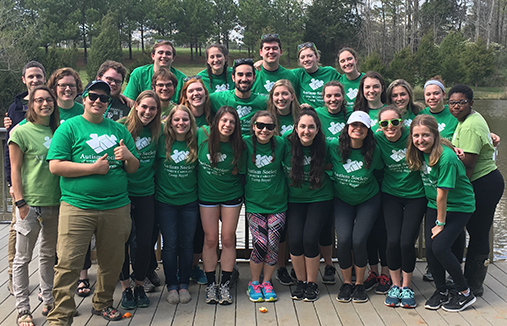New outlooks on autism
By Katie Johnson
What does it mean to be an ally? That’s something I asked my fellow University of Delaware colleagues multiple times over spring break and something nearly 600 UD students all over the country have been thinking about. They and I are a part of an organization called University of Delaware alternative Breaks (UDaB).
UDaB is a student-run organization at UD that coordinates service-based learning experiences across the country that focus on social issues. Our 20 trips this spring break emphasized working with communities rather than for them. UDaB considers listening to be the first step in becoming an ally, and focuses on education and reflection as a means of moving people to becoming more active citizens in their own communities. It’s about so much more than just a week of service!
I was honored to lead the trip to Camp Royall, an overnight, recreational, outdoors camp for school-aged individuals with autism in North Carolina. Beforehand, for six weeks, my co-site leader Lauren and I had prepped our 19 “alternative Breakers”, many of whom had never interacted closely with someone on the spectrum, with weekly meetings relating to social justice, privilege and steps to becoming effective allies in relation to the autistic community. From assignments researching articles and blogs of individuals with ASD, watching TedTalks on neurodiversity, and completing checklists and watching videos designed to examine privilege and oppression in relation to disability, our colleagues readied themselves for a week outside their comfort zone.
At the camp, our 12-hour days and two-hour reflection sessions left our fellow student colleagues bombarded with the realities and complexities of autism as a social issue. Mark, assistant director of Camp Royall, trained our participants about the interconnected nature of social categorizations like race, class, gender and ability level, the value of unconditional positive regard, and the need to understand and appreciate all forms of communication. While the focus of Camp Royall is to provide a safe space specifically to meet the needs of individuals with ASD, Mark reminded us that this sanctuary is so much more than for people with autism; it’s a space for all aspects of diversity. It is truly a place where all people are not just accepted but celebrated!
With this being my second UDaB trip to Camp Royall, I’ve begun to more deeply reflect on Camp Royall as a sanctuary. So many of our campers have incredibly difficult and unknowable lives, where they are often not accepted in their own communities, sometimes restrained or abused in schools or at home, and face a variety of difficulties simply because of how others view and react towards them. My colleagues from UD also have begun to understand what it means to celebrate people for who they are, to step into another’s shoes, to examine people’s strengths when society often focuses on the weaknesses, and to question our role in effecting change. Many of our “alternative Breakers” changed their outlook on autism and society’s role in the challenges people face.
Back at UD, all 21 of us feel we’ve been impacted by our experience directly working with this community, and believe we’re ready to be more informed and engaged citizens and allies with the autistic community. Lauren and I hope our peers will continue to question the world around them and their role in creating more inclusive and celebratory communities.
Categories: autism, diversity, Education, inclusion, University of Delaware
Tags: Camp Royall, University of Delaware alternative Breaks (UDaB).



Comments